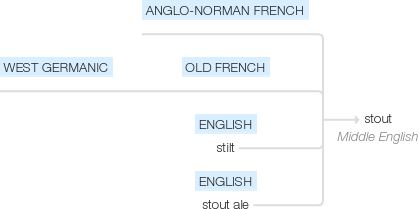Stout
Middle English: from Anglo-Norman French and Old French dialect, of West Germanic origin; perhaps related to stilt. The noun (late 17th century) originally denoted any strong beer and is probably elliptical for stout ale .
wiktionary
From Middle English stoute, from Old French estout(“brave, fierce, proud”) (Modern French dialectal stout(“proud”)), from earlier Old French estolt(“strong”), from Frankish *stolt, *stult(“bold, proud”), from Proto-Germanic *stultaz(“bold, proud”), from Proto-Indo-European *stel-(“to put, stand”).
Cognate with Dutch stout(“stout, bold, naughty”), Low German stolt(“stately, proud”), German stolz(“proud, haughty, arrogant, stately”), Old Norse stoltr(“proud”) (Danish stolt(“proud”), Icelandic stoltur(“proud”)).
Meaning "strong in body, powerfully built" is attested from c.1386, but has been to a large extent displaced by the euphemistic meaning "thick-bodied, fat and large," which is first recorded 1804. Original sense preserved in stout-hearted (1552).
The noun "strong, dark-brown beer" is first recorded 1677, from the adjective.
From Middle English stout, from Old English stūt(“gnat; midge”).
etymonline
stout (adj.)
c. 1300, "proud, valiant, strong," from Old French estout "brave, fierce, proud," earlier estolt "strong," from a Germanic source from West Germanic *stult- "proud, stately, strutting" (source also of Middle Low German stolt "stately, proud," German stolz "proud, haughty, arrogant, stately"), from PIE root *stel- "to put, stand, put in order," with derivatives referring to a standing object or place.
Meaning "strong in body, powerfully built" is attested from late 14c., but has been displaced by the (often euphemistic) meaning "thick-bodied, fat and large, bulky in figure," which is first recorded 1804. Original sense preserved in figurative phrase stout-hearted (1550s). Related: Stoutly; stoutness.
stout (n.)
1670s, "strong beer or ale," from stout (adj.). Later especially, and now usually, "porter of extra strength" (by 1762).
